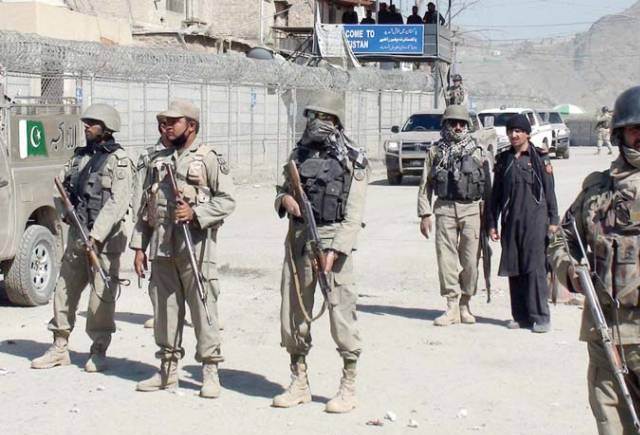Pakistan has down played the recent skirmishes ‘instigated by enemies’ on the Pak-Afghan border while stressing the need for improved border management controls amid growing tensions between Kabul and Islamabad.
Defence Minister Khawaja Asif while briefing the upper house of parliament on Thursday said Islamabad wanted brotherly relations with Kabul despite on-ground grievances.
“We have no dispute with Afghanistan,” he said. “The enemies of Pakistan do not want it to progress neither do they want it to live in peace with Afghanistan and they are playing an effective role in doing just that.”
Unprovoked firing by Afghan forces in Torkham over a fencing dispute has claimed the life of a Pakistani soldier and injured dozens of civilians. After three days of clashes, the guns fell silent in Khyber Agency on Wednesday after top level interaction between both sides.
The Afghan ambassador met senior Pakistani officials, including the army chief, and agreed the Afghan side would allow construction of the gate to regulate movement of people and traffic across the border.
Reading out the government’s policy statement in the lower house of parliament, Foreign Affairs Adviser Sartaj Aziz underscored the need for effective border management for ensuring peace both in Pakistan and Afghanistan.
The adviser reaffirmed the government’s commitment to complete construction of a transit terminal at the Torkham border, terming it a part of the plan to “strengthen border control and regulate cross-border movements”.
Pakistan wants to install a gate at Torkham and fence the border in an effort to curb cross-border movement of militants from Afghanistan amid increasing evidence linking attacks inside Pakistan to terrorists from the neighbouring country.
Aziz said Afghanistan initiated unprovoked firing despite the border gate being constructed 31 metres inside the Pakistani border.
He said Islamabad had informed the Afghan authorities beforehand regarding its new policy to strictly follow documentation procedures, which were necessary to curb terrorism, infiltration, smuggling and trafficking.
“Pakistan did not show aggression or instigated the Afghans in the first place. It was the other way round,” the adviser said, adding he had contacted the Afghan foreign minister and national security adviser to “sit together and remove the gaps in communication or any misunderstandings”.
He emphasised it was important for both sides to resolve issues through dialogue. “These tensions are against the spirit of friendship between both the countries which share a common religion, cultural values and strong bonds between the people,” Aziz believed.
Meanwhile in Senate, the defence minister believed matters with Kabul could be easily resolved with the return of the three million Afghan refugees living in Pakistan for nearly four decades. “If the refuges return, there will be no accusations on us of Quetta Shura or Haqqani Network,” he added.
“The environment is already vitiating,” the minister said. “If the Pak-Afghan border is sorted out and there are proper crossings, then neither of us will complain. Pakistan has had to pay a hefty price for Afghan refugees.”
Asif lamented that while Kabul had developed immigrations offices on its side of the border, it was not allowing Pakistan to develop them on its side. “Afghan delegations acknowledge the importance of Torkham for development but they always change their mind after getting to Kabul,” he added.
He said Afghanistan objected to having any check-posts, crossing or gate on its border with Pakistan, whereas Pakistan shared its border with India with mutual agreement.
“For the past 18 months, we have been negotiating with the Afghan government to make border management effective,” he said, adding the government would not accept any arguments against it.
FO briefing
In his weekly briefing, the foreign office spokesperson confirmed both sides were in touch at diplomatic and military levels “to address the tension and communication gaps”.
“Afghanistan is our neighbour and we have a special relationship with it rooted in religion, common culture as well as the fraternal bond between the people of the two countries,” Nafees Zakaria said.
“We believe effective border management is essential to address concerns on both sides and we have reiterated this time and again. This is an essential part of our counter-terrorism efforts. The unregulated cross-border movements provide opportunity for infiltration to terrorists and militants,” he added.
The FO spokesman termed the recent tension at the border “unfortunate and against the spirit of friendship between Pakistan and Afghanistan”.
He added Kabul was being misguided by those who were not interested in seeing peace in Afghanistan. “We have urged Kabul to take necessary steps to avoid recurrence of such incidents in the future.”
Zakaria said Torkham gate was just a start and Islamabad would establish border management infrastructure at many other crossings.






